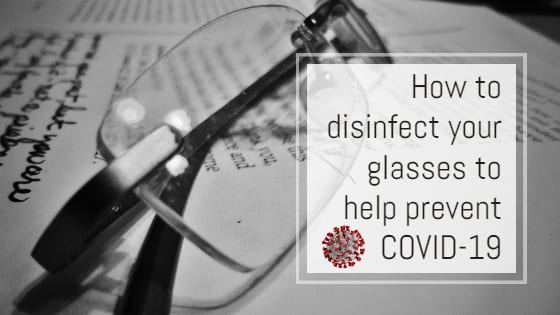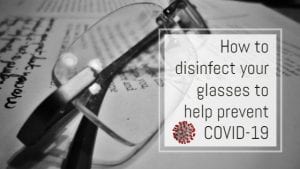
29 Apr How to disinfect your glasses to help prevent COVID-19
How to disinfect your glasses to help prevent COVID-19
We´ve all seen the warnings and numerous memes about avoiding touching your face during these troubling times. This, obviously, is difficult when you wear eyeglasses! Another thing to point out is that eyeglasses (both lenses and frames) can potentially transfer viruses and bacteria, such as COVID-19, to your eyes, nose and mouth. This is because they are easily transferred from your surroundings to your hands and then from your hands to your glasses.
Research has shown that the coronavirus can last on glass surfaces for as long as 9 days! Even taking plenty of care and regularly washing your hands following the hand washing guidelines, you can easily touch your glasses then touch your eyes, nose or mouth, thereby continue the cycle of contamination.
This danger increases for people with presbyopia, age related farsightedness that tends to affect those aged 40 and over. People in this category who wear reading glasses tend to put them on and take them off several times throughout the day. Needless to say, this is even more worrisome due to the fact that this age group is at higher risk for more serious complications from COVID-19.
What we´re here to tell you is that disinfecting your glasses is quite straightforward and easy! We´re going to explain what you should (and shouldn’t) do to disinfect your lenses at home.
Occasionally, over the years, our patients have asked us if it is possible to use household rubbing-alcohol to clean their glasses. This may seem like a good idea to disinfect your glasses but we suggest not using it. The alcohol may be too harsh for your eyeglasses and may damage or compromise any special coatings on your lenses.
While we´re covering the topic of products to avoid, we would also recommend staying away from ammonia, bleach or anything with high concentrations of acid, even natural products such as lemon juice or vinegar, which can damage lens coatings and some eye wear materials.
So, now that we have eliminated the substances and chemicals we recommend you should avoid, let´s look at what we feel is safe to clean and disinfect your eye wear.
Washing Up Liquid and Water
The easiest and most efficient way to clean and disinfect your lenses is to use lukewarm water with gentle washing up liquid. Hold the lenses under running tap water first to remove any lose particles that may scratch the lenses as you clean them. Put a drop of washing up liquid on both of the lenses and massage the soap onto both sides, the nose pads, along the frame sides and finally, the earpieces. Dry your glasses using a microfiber cloth (avoid using paper towels, as they may contain fibres that could scratch your lenses).
Lens Cleaning Wipes or Spray
Pre-moistened lens wipes or lens cleaning sprays are excellent for cleaning your glasses. They can also be used to clean your mobile phone, tablet and computer screen. They remove bacteria, dust, dirt and germs from your glasses and the inbuilt formula restores shine to glass surfaces without leaving any streaks or residue. The durable material in the wipes is tough enough to remove stains, while being gentle enough not to scratch your screens or lenses. The wipes come individually packaged so you can carry them with you when you are out and about. We, at OpticalRooms, sell these wipes and we´re continuing to provide online purchasing and home delivery during the lock-down period.
We have a very effect spray Optase Protect that offers a triple action anti-bacterial, anti fungal and anti-viral that you spray on the closed eyes and face, removing the risk of infection on the skin and eyes.
With this information in mind, disinfecting your glasses should be stress free and straightforward. Just follow our easy directions to protect your lenses and your health.
On behalf of all of us at OpticalRooms, we sincerely hope that you and your nearest and dearest stay healthy and safe during these uncertain times.